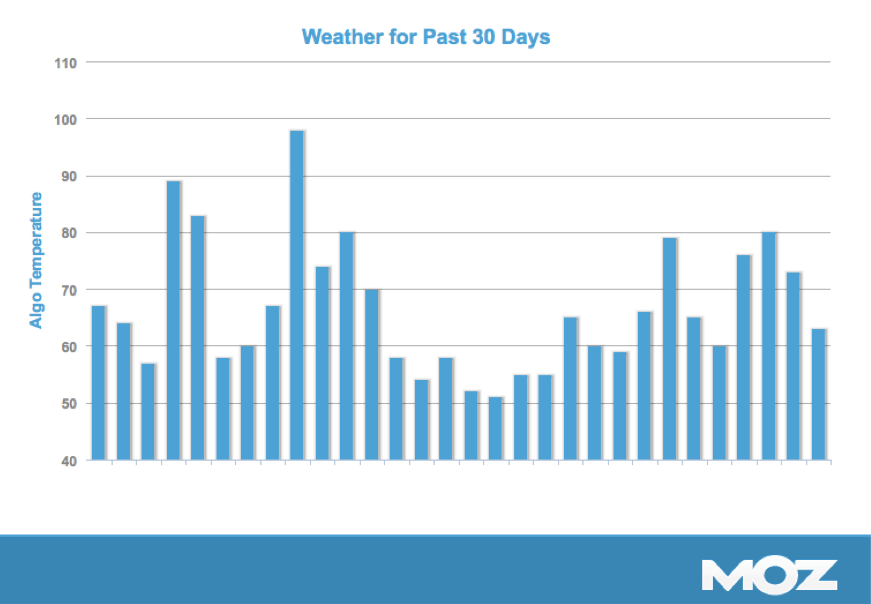
We often hear about the great SEO success stories, but for every successful SEO program, there are many more that don’t quite work out the way they were supposed to.
There are many reasons for this, mainly because SEO doesn’t have specific guidelines to follow that guarantee success. Sure, there are best practices, but even those are constantly changing.
Here are a few of the most common reasons why your SEO program might not be working out.
1) The Wrong Metrics Are Being Measured
Measuring the right metrics and understanding the significance of those metrics is critical to keeping your SEO program on track. Below are three important areas of SEO that you should be monitoring.
Traffic: monitor how many visitors are entering and exiting your site. You can identify where they are coming from, why they are leaving, and why they might (or might not) be coming back.
How to measure: visits, unique visitors, bounce rate, exit rate, new vs returning, frequency & recency.
Conversions: see how your site is performing as a marketing tool. Determine how customers are engaging with your content and how users are responding to your most important pages.
How to measure: conversion rate, heat maps, average site duration, pages/visit, page views.
Ranking: of course, you need to see how your rankings are progressing for certain keywords. That’s one of the purposes of the campaign isn’t it?
How to measure: use rank checking tools like Google PageRank Checker.
Action Steps:
- Have your tracking system in place from the get-go.
- Understand how each of these metrics relates to your current goals.
4) Website Content And Design Are Highly Important
Many companies start an SEO campaign without first considering their website’s design. A poorly constructed site can make if difficult for users to navigate. We’ve already talked extensively about user experience and how Google uses that as an element to determining rankings.
Similarly, if search engines can’t crawl through your site, they can’t index it. It’s a double whammy. Add some poorly written content and you’ve got yourself a serious problem.
Even if you manage to attract a lot of visitors to your site, you’re at the mercy of that poor content. Users aren’t going to stick around to see what you have to offer, and they probably won’t convert.
It’s hard to develop a strong web presence without having a well designed website.
Action Steps:
- See these 6 ways to improve your site navigation.
- Make sure your site is crawlable.
- Avoid using Flash or JavaScript in excess. They can make it harder for spiders to crawl.
5) Losing Sight Of The Big Picture

The biggest mistake SEO managers make is focusing too much on SEO goals and not enough on the company’s overall marketing goals.
The point of SEO is to increase your web presence, make your resources more available, and expand your industry influence, all the while encouraging customers to convert.
The point is not just to have an awesome page ranking. Page rankings alone don’t make money. Customers still have to click and convert.
SEO is only one piece of the big picture. Your SEO goals shouldn’t stand alone. The most successful managers align their SEO goals with the goals of the company’s overall online marketing strategy.
Action Steps:
- Ask yourself: do my SEO efforts fit into the big picture or am I treating them like a separate entity?
- Rethink how SEO is affecting your bottom line.
6) Unreliable Resources
Neglecting to do extensive research on SEO best practices, keywords, and other relevant data can definitely hinder your program. Research is a necessary part of developing a successful campaign.
While a quick Google search on SEO brings up millions of articles, not every one of them has accurate, up-to-date information.
Be wary of the information you gather, and always cross check with multiple references. Just because your favorite SEO blogger says title tags and meta descriptions are obsolete, it doesn’t mean they actually are.
Outdated information can be your worst nightmare. SEO best practices are never set in stone. The game is constantly changing.
Action Steps:
- Pay attention to site metrics as you make SEO changes—you’ll catch a small problem before it becomes a big one.
- Plenty of seemingly innovative posts are just rewrites of what someone already said on a different blog. Rely on reputable sources that do their own homework like The Moz Blog and Search Engine Land.
7) Algorithm Updates

This is similar to the previous point. Part of your research should involve knowing what’s happening with Google’s algorithm.
Not understanding the latest update is like trying to travel across the country with an outdated GPS. You might make a few correct turns once in a while, but most of the time, you’ll be lost.
This is the best way to avoid accidentally using SEO tactics that could get you penalised like stuffing too many keywords into an article.
Be prepared to make adjustments. Search Engine Watch gives a detailed rundown of what kind of updates you can expect from Google in 2014.
Actin Steps:
- Use MozCast, one of our top 30 SEO tools, to track the “weather patterns” of the Google algorithm. It alerts you to major and minor changes.
- Moz.com also tracks algorithm updates as they happen.
8) Efforts Are Stopped Too Soon
Patience is a virtue. Don’t throw in the towel too soon!
It can take months to see significant improvements from your SEO efforts. There’s a reason most vendors encourage you to stick with them for 4-6 months. It takes time for things to develop.
Google wants to see that your links are here to stay. They want to see stability and longevity, because these two attributes affect your credibility.
Granted, there are opportunities to grab some low hanging fruit. Improving rich snippets, increasing your site speed, and adding a few select keywords may produce good short-term results, but to see a better overall ROI from SEO, patience is necessary.
Action Steps:
- Grab those long hanging fruits, but be prepared to make adjustments over the long haul.
- Refer back to your metrics often to see what improvements can be made and how your campaign is progressing.
- Put together a realistic timeline so everyone has the same expectations.
9) Unreasonable Expectations
Your goals are the foundation of your entire campaign, and as we’ve mentioned before on this blog, different objectives require different SEO strategies.
Are you trying to create more brand awareness? Looking to increase traffic? Improve conversions?
Your SEO decisions depend on your answers to questions like these.
Setting unrealistic goals sets you up for failure, so make goals that are reasonable. If you don’t have the resources or manpower to implement a full-fledged SEO plan right away, you can’t expect to see a high ROI immediately.
If you’re competing for some crowded keywords, a number one ranking might be unrealistic. Making it onto the first page might be a more reasonable expectation.
Few people get SEO exactly right on the first try. Persistence is as important as patience, and doing both are harder when you get discouraged because your goals continue to be out of reach.
Action Steps:
- Set realistic goals and benchmarks based on criteria relevant to your site.
- Always have short term and long-term goals, and adjust them if necessary. No goal should be completely set in stone.
Final Thoughts
The only thing that’s certain in the world of SEO is change. Algorithms, competitors, best practices, and user preferences are always changing, which means you can’t expect everything to go exactly as planned.
There are steps you can take today to increase the likelihood of having a successful campaign. Be aware of these common SEO problems so you can avoid the pitfalls I see companies stumble over all too often.
What common problems have you learned to avoid with your SEO program?
Share your thoughts in the comments.




